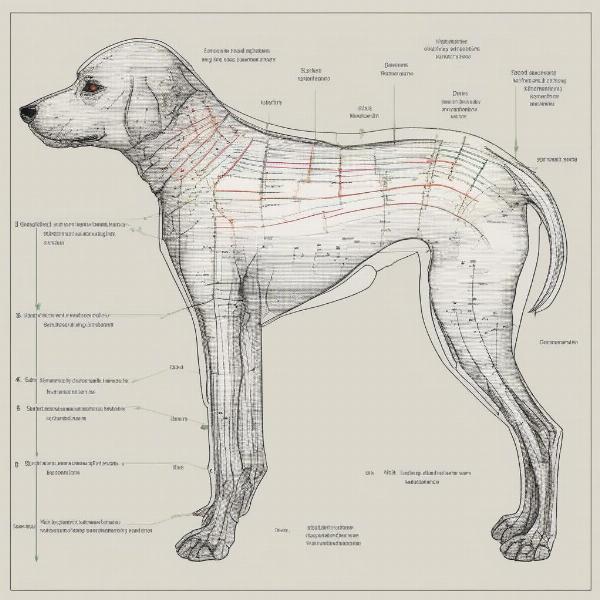Acupuncture, an ancient Chinese practice, is increasingly used as a complementary therapy for dogs. While generally considered safe, it’s important to be aware of the potential common side effects of acupuncture in dogs. Understanding these can help owners make informed decisions and ensure the best possible experience for their furry companions.
 Acupuncture Points on a Dog
Acupuncture Points on a Dog
While acupuncture boasts numerous benefits for dogs, like pain relief and improved mobility, it’s not entirely without potential side effects. Most of these are mild and temporary, but knowing what to expect can ease any concerns you might have.
What to Expect After Your Dog’s Acupuncture Session
After an acupuncture session, some dogs may exhibit minor and transient side effects. These are typically a sign that the treatment is working and the body is responding to the stimulation of acupuncture points.
-
Minor Bleeding or Bruising: Small pinpricks from the needles can sometimes cause minor bleeding or bruising at the insertion site. This is usually minimal and resolves quickly.
-
Temporary Soreness: Some dogs experience mild soreness or discomfort at the needle insertion sites, similar to a minor muscle ache. This is typically short-lived and dissipates within a day or two.
-
Increased Thirst and Urination: Acupuncture can sometimes stimulate the kidneys, leading to increased thirst and urination in some dogs. Make sure your dog has access to fresh water.
-
Drowsiness or Lethargy: After a session, your dog may seem a bit more tired or sleepy than usual. This is a normal response to the relaxation induced by acupuncture.
-
Changes in Appetite: While less common, some dogs may experience a temporary change in appetite after treatment. This could be an increase or decrease in their usual food intake.
Are There Serious Side Effects?
Serious side effects from acupuncture are rare, particularly when performed by a qualified and experienced veterinary acupuncturist. However, it’s important to be aware of the potential risks, even if minimal. These include:
-
Infection: While rare, infection at the needle insertion site is a possibility if sterile techniques are not followed. Choose a certified veterinary acupuncturist who adheres to strict hygiene protocols.
-
Pneumothorax: This is a rare but serious complication involving puncture of the lung. It’s more of a concern in deep chest acupuncture and is unlikely to occur with a skilled practitioner.
-
Organ Damage: Incorrect needle placement could potentially damage internal organs. Again, this is highly unlikely with a qualified and experienced veterinarian.
When to Contact Your Veterinarian
While mild side effects are usually nothing to worry about, it’s essential to contact your veterinarian if you notice any of the following:
- Excessive bleeding or bruising at the needle insertion sites.
- Swelling, redness, or heat at the insertion sites, indicating possible infection.
- Persistent or worsening pain or discomfort.
- Difficulty breathing or other signs of respiratory distress.
- Any unusual or concerning changes in your dog’s behavior or condition.
What Makes Acupuncture a Safe Treatment Option?
Despite the potential for side effects, acupuncture is generally considered a safe complementary therapy for dogs. Several factors contribute to its safety profile:
- Thin Needles: The needles used in acupuncture are extremely thin, minimizing tissue trauma.
- Sterile Techniques: Reputable veterinary acupuncturists use sterile needles and follow strict hygiene protocols to prevent infection.
- Minimal Invasiveness: Acupuncture is a minimally invasive procedure compared to many other medical interventions.
- Holistic Approach: Acupuncture aims to stimulate the body’s natural healing abilities, reducing the need for medications in some cases.
Conclusion
Understanding the common side effects of acupuncture in dogs can help owners feel more confident about this complementary therapy. While minor side effects are typical and generally resolve quickly, it’s important to monitor your dog and contact your veterinarian if you have any concerns. By choosing a qualified and experienced veterinary acupuncturist, you can minimize risks and maximize the potential benefits of this ancient practice for your furry friend.
FAQ
-
How long do the effects of acupuncture last in dogs? The duration of the effects can vary depending on the individual dog and the condition being treated. Some dogs may experience immediate relief, while others may require multiple sessions to see significant improvement.
-
Is acupuncture painful for dogs? Most dogs tolerate acupuncture well and don’t show signs of pain. Some may experience a mild tingling sensation or pressure at the needle insertion sites.
-
How often should my dog receive acupuncture treatments? The frequency of treatments depends on the individual dog and the condition being treated. Your veterinarian will recommend an appropriate treatment schedule.
-
Can acupuncture be used in conjunction with other treatments? Yes, acupuncture can be used alongside conventional veterinary medicine and other complementary therapies.
-
Are there any breeds of dogs that shouldn’t receive acupuncture? Generally, acupuncture is safe for most dog breeds. However, it’s important to discuss any underlying health conditions with your veterinarian before starting treatment.
ILM Dog is a leading online resource for dog owners worldwide, dedicated to providing expert advice on all aspects of dog care, from breed selection and health to training, nutrition, and grooming. We strive to empower dog owners with the knowledge and resources they need to provide the best possible care for their beloved companions. Learn more about dog health and well-being and discover a wide range of products and accessories on our website. For inquiries, contact us at [email protected] or +44 20-3965-8624. Visit ILM Dog for expert advice and resources for your canine companion.